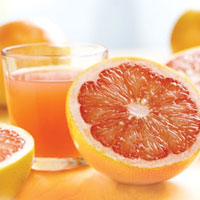
Rapamycin has shown some promise in stopping the growth of new blood vessels -- which cancer tumors need to grow -- but it is expensive and poorly absorbed.
Doctors have long argued that grapefruit juice should not be taken with medications because it can interfere with enzymes that break down certain drugs.
In the case of rapamycin however, this interference appears to make the drugs more potent.
"Grapefruit juice can increase blood levels of certain drugs three to five times," said study director Ezra Cohen, MD, a cancer specialist at the University of Chicago Medical Center.
"This has always been considered a hazard. We wanted to see if, and how much, it could amplify the availability, and perhaps the efficacy of rapamycin, a drug with promise for cancer treatment."
The trial showed that the juice appears to ramp up the drug's potency," he said.
Many patients in the study reported side effects, however.
More than half experienced elevated blood sugar levels, diarrhea, low white blood cell counts or fatigue.
A second study presented at the conference found that walnut consumption could provide the body with essential Omega-3 fatty acids, antioxidants and phytosterols that reduce the risk of breast cancer.
"Walnuts are better than cookies, French fries or potato chips when you need a snack," said Elaine Hardman, associate professor of medicine at Marshall University School of Medicine, who conducted her research on laboratory mice.
Hardman and her fellow researchers studied mice fed a diet that they estimated was the human equivalent of two ounces of walnuts per day. A separate group of mice were fed a control diet.
Tests showed that walnut consumption significantly decreased breast tumor incidence, the number of glands with a tumor and tumor size.
"These laboratory mice typically have 100 percent tumor incidence at five months; walnut consumption delayed those tumors by at least three weeks," she said.
The third study found that drinking wine may increase survival among patients suffering from non-Hodgkin's lymphoma.
Researcher Xuesong Han, a doctoral candidate at the Yale School of Public Health, analyzed data about 546 women with lymph node cancer and found that those who drank wine had a 76 percent five-year survival rate compared with 68 percent for non-wine drinkers.
Additional research found that the five-year, disease-free survival rate was 70 percent among those who drank wine, compared with 65 percent among non-wine drinkers.
"This conclusion is controversial, because excessive drinking has a negative social and health impact, and it is difficult to define what is moderate and what is excessive," said Han.
Still, she said, "we are continually seeing a link between wine and positive outcomes in many cancers."
Founded in 1907, AACR is the world's oldest and largest professional organization dedicated to advancing cancer research, with a membership including more than 28,000 researchers, health care professionals and cancer survivors in nearly 90 countries.
----------------------------------------------------------------------------------------------------
Doctors have long argued that grapefruit juice should not be taken with medications because it can interfere with enzymes that break down certain drugs.
In the case of rapamycin however, this interference appears to make the drugs more potent.
"Grapefruit juice can increase blood levels of certain drugs three to five times," said study director Ezra Cohen, MD, a cancer specialist at the University of Chicago Medical Center.
"This has always been considered a hazard. We wanted to see if, and how much, it could amplify the availability, and perhaps the efficacy of rapamycin, a drug with promise for cancer treatment."
The trial showed that the juice appears to ramp up the drug's potency," he said.
Many patients in the study reported side effects, however.
More than half experienced elevated blood sugar levels, diarrhea, low white blood cell counts or fatigue.
A second study presented at the conference found that walnut consumption could provide the body with essential Omega-3 fatty acids, antioxidants and phytosterols that reduce the risk of breast cancer.
"Walnuts are better than cookies, French fries or potato chips when you need a snack," said Elaine Hardman, associate professor of medicine at Marshall University School of Medicine, who conducted her research on laboratory mice.
Hardman and her fellow researchers studied mice fed a diet that they estimated was the human equivalent of two ounces of walnuts per day. A separate group of mice were fed a control diet.
Tests showed that walnut consumption significantly decreased breast tumor incidence, the number of glands with a tumor and tumor size.
"These laboratory mice typically have 100 percent tumor incidence at five months; walnut consumption delayed those tumors by at least three weeks," she said.
The third study found that drinking wine may increase survival among patients suffering from non-Hodgkin's lymphoma.
Researcher Xuesong Han, a doctoral candidate at the Yale School of Public Health, analyzed data about 546 women with lymph node cancer and found that those who drank wine had a 76 percent five-year survival rate compared with 68 percent for non-wine drinkers.
Additional research found that the five-year, disease-free survival rate was 70 percent among those who drank wine, compared with 65 percent among non-wine drinkers.
"This conclusion is controversial, because excessive drinking has a negative social and health impact, and it is difficult to define what is moderate and what is excessive," said Han.
Still, she said, "we are continually seeing a link between wine and positive outcomes in many cancers."
Founded in 1907, AACR is the world's oldest and largest professional organization dedicated to advancing cancer research, with a membership including more than 28,000 researchers, health care professionals and cancer survivors in nearly 90 countries.
----------------------------------------------------------------------------------------------------









 Home
Home Politics
Politics









